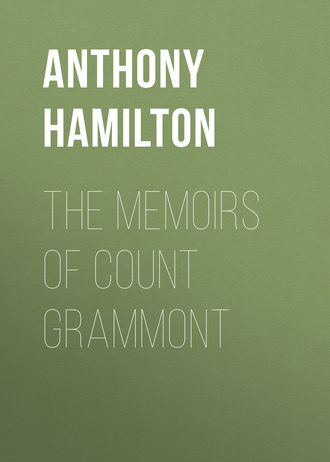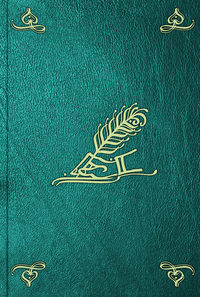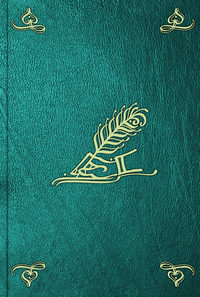 полная версия
полная версияThe Memoirs of Count Grammont
“The little chub I had to encounter was full as inquisitive as the other. He desired to know whether I came from the army in Piedmont; and having told him I was going thither, he asked me, whether I had a mind to buy any horses; that he had about two hundred to dispose of, and that he would sell them cheap. I began to be smoked like a gammon of bacon; and being quite wearied out, both with their tobacco and their questions, I asked my companion if he would play for a single pistole at backgammon, while our men were supping; it was not without great ceremony that he consented, at the same time asking my pardon for his great freedom.
“I won the game; I gave him his revenge, and won again. We then played double or quit; I won that too, and all in the twinkling of an eye; for he grew vexed, and suffered himself to be taken in so that I began to bless my stars for my good fortune. Brinon came in about the end of the third game, to put me to bed, he made a great sign of the cross, but paid no attention to the signs I made him to retire. I was forced to rise to give him that order in private. He began to reprimand me for disgracing myself by keeping company with such a low-bred wretch. It was in vain that I told him he was a great merchant, that he had a great deal of money, and that he played like a child. ‘He a merchant,’ cried Brinon. ‘Do not believe that, sir! May the devil take me, if he is not some conjurer.’ ‘Hold your tongue, old fool,’ said I; ‘he is no more a conjurer than you are, and that is decisive; and, to prove it to you, I am resolved to win four or five hundred pistoles of him before I go to bed. With these words I turned him out, strictly enjoining him not to return, or in any manner to disturb us.
“The game being done, the little Swiss unbuttoned his pockets, to pull out a new four-pistole piece, and presenting it to me, he asked my pardon for his great freedom, and seemed as if he wished to retire. This was not what I wanted. I told him we only played for amusement; that I had no design upon his money; and that, if he pleased, I would play him a single game for his four pistoles. He raised some objections; but consented at last, and won back his money. I was piqued at it. I played another game; fortune changed sides; the dice ran for him, he made no more blots. I lost the game; another game, and double or quit; we doubled the stake, and played double or quit again. I was vexed; he, like a true gamester, took every bet I offered, and won all before him, without my getting more than six points in eight or ten games. I asked him to play a single game for one hundred pistoles; but as he saw I did not stake, he told me it was late; that he must go and look after his horses; and went away, still asking my pardon for his great freedom. The cool manner of his refusal, and the politeness with which he took his leave, provoked me to such a degree, that I could almost have killed him. I was so confounded at losing my money so fast, even to the last pistole, that I did not immediately consider the miserable situation to which I was reduced.
“I durst not go up to my chamber for fear of Brinon. By good luck, however, he was tired with waiting for me, and had gone to bed. This was some consolation, though but of short continuance. As soon as I was laid down, all the fatal consequences of my adventure presented themselves to my imagination. I could not sleep. I saw all the horrors of my misfortune, without being able to find any remedy; in vain did I rack my brain; it supplied me with no expedient. I feared nothing so much as daybreak; however, it did come, and the cruel Brinon along with it. He was booted up to the middle, and cracking a cursed whip, which he held in his hand, ‘Up, Monsieur le Chevalier,’ cried he, opening the curtains; ‘the horses are at the door, and you are still asleep. We ought by this time to have ridden two stages; give me money to pay the reckoning.’ ‘Brinon,’ said I, in a dejected tone, ‘draw the curtains.’ ‘What!’ cried he, ‘draw the curtains! Do you intend, then, to make your campaign at Lyons? you seem to have taken a liking to the place. And for the great merchant, you have stripped him, I suppose? No, no, Monsieur le Chevalier, this money will never do you any good. This wretch has, perhaps, a family; and it is his children’s bread that he has been playing with, and that you have won. Was this an object to sit up all night for? What would my lady say, if she knew what a life you lead?’ ‘M. Brinon,’ said I, ‘pray draw the curtains.’ But instead of obeying me, one would have thought that the devil had prompted him to use the most pointed and galling terms to a person under such misfortunes. ‘And how much have you won?’ said he; ‘five hundred pistoles? what must the poor man do?
“‘Recollect, Monsieur le Chevalier, what I have said, this money will never thrive with you. It is, perhaps, but four hundred? three? two? well if it be but one hundred louis d’or, continued he, seeing that I shook my head at every sum which he had named, there is no great mischief done; one hundred pistoles will not ruin him, provided you have won them fairly.’ ‘Friend Brinon,’ said I, fetching a deep sigh, ‘draw the curtains; I am unworthy to see daylight’ Brinon was much affected at these melancholy words, but I thought he would have fainted, when I told him the whole adventure. He tore his hair, made grievous lamentations, the burden of which still was, ‘What will my lady say?’ And, after having exhausted his unprofitable complaints, ‘What will become of you now, Monsieur le Chevalier?’ said he, ‘what do you intend to do?’ ‘Nothing,’ said I, ‘for I am fit for no thing. After this, being somewhat eased after making him my confession, I thought upon several projects, to none of which could I gain his approbation. I would have had him post after my equipage, to have sold some of my clothes. I was for proposing to the horse-dealer to buy some horses of him at a high price on credit, to sell again cheap. Brinon laughed at all these schemes, and after having had the cruelty of keeping me upon the rack for a long time, he at last extricated me. Parents are always stingy towards their poor children; my mother intended to have given me five hundred louis d’or, but she had kept back fifty, as well for some little repairs in the abbey, as to pay for praying for me. Brinon had the charge of the other fifty, with strict injunctions not to speak of them, unless upon some urgent necessity. And this you see soon happened.
“Thus you have a brief account of my first adventure. Play has hitherto favoured me; for, since my arrival, I have had, at one time, after paying all my expenses, fifteen hundred louis d’or. Fortune is now again become unfavourable: we must mend her. Our cash runs low; we must, therefore, endeavour to recruit.”
“Nothing is more easy,” said Matta; “it is only to find out such another dupe as the horse-dealer at Lyons; but now I think on it, has not the faithful Brinon some reserve for the last extremity? Faith, the time is now come, and we cannot do better than to make use of it!”
“Your raillery would be very seasonable,” said the Chevalier, “if you knew how to extricate us out of this difficulty. You must certainly have an overflow of wit, to be throwing it away upon every occasion as at present. What the devil! will you always be bantering, without considering what a serious situation we are reduced to. Mind what I say, I will go tomorrow to the head-quarters, I will dine with the Count de Cameran, and I will invite him to supper.” “Where?” said Matta. “Here,” said the Chevalier. “You are mad, my poor friend,” replied Matta. “This is some such project as you formed at Lyons: you know we have neither money nor credit; and, to re-establish our circumstances, you intend to give a supper.”
“Stupid fellow!” said the Chevalier, “is it possible, that, so long as we have been acquainted, you should have learned no more invention? The Count de Cameran plays at quinze, and so do I; we want money; he has more than he knows what to do with; I will bespeak a splendid supper, he shall pay for it. Send your maitre-d’hotel to me, and trouble yourself no further, except in some precautions, which it is necessary to take on such an occasion.” “What are they?” said Matta. “I will tell you,” said the Chevalier; “for I find one must explain to you things that are as clear as noon-day.”
“You command the guards that are here, don’t you? As soon as night comes on, you shall order fifteen or twenty men, under the command of your sergeant La Place, to be under arms, and to lay themselves flat on the ground, between this place and the head-quarters.” “What the devil!” cried Matta, “an ambuscade? God forgive me, I believe you intend to rob the poor Savoyard. If that be your intention, I declare I will have nothing to say to it” “Poor devil!” said the Chevalier, “the matter is this; it is very likely that we shall win his money. The Piedmontese, though otherwise good fellows, are apt to be suspicious and distrustful. He commands the horse; you know you cannot hold your tongue, and are very likely to let slip some jest or other that may vex him. Should he take it into his head that he is cheated, and resent it, who knows what the consequences might be? for he is commonly attended by eight or ten horsemen. Therefore, however he may be provoked at his loss, it is proper to be in such a situation as not to dread his resentment.”
“Embrace me, my dear Chevalier,” said Matta, holding his sides and laughing; “embrace me, for thou art not to be matched. What a fool I was to think, when you talked to me of taking precautions, that nothing more was necessary than to prepare a table and cards, or perhaps to provide some false dice! I should never have thought of supporting a man who plays at quinze by a detachment of foot: I must, indeed, confess that you are already a great soldier.”
The next day everything happened as the Chevalier Grammont had planned it; the unfortunate Cameran fell into the snare. They supped in the most agreeable manner possible Matta drank five or six bumpers to drown a few scruples which made him somewhat uneasy. The Chevalier de Grammont shone as usual, and almost made his guest die with laughing, whom he was soon after to make very serious; and the good-natured Cameran ate like a man whose affections were divided between good cheer and a love of play; that is to say, he hurried down his victuals, that he might not lose any of the precious time which he had devoted to quinze.
Supper being done, the sergeant La Place posted his ambuscade, and the Chevalier de Grammont engaged his man. The perfidy of Cerise, and the high-crowned hat, were still fresh in remembrance, and enabled him to get the better of a few grains of remorse, and conquer some scruples which arose in his mind. Matta, unwilling to be a spectator of violated hospitality, sat down in an easy chair, in order to fall asleep, while the Chevalier was stripping the poor Count of his money.
They only staked three or four pistoles at first, just for amusement; but Cameran having lost three or four times, he staked high, and the game became serious. He still lost, and became outrageous; the cards flew about the room, and the exclamations awoke Matta.
As his head was heavy with sleep, and hot with wine, he began to laugh at the passion of the Piedmontese, instead of consoling him. “Faith, my poor Count,” said he, “if I were in your place, I would play no more.” “Why so?” said the other. “I don’t know,” said he, “but my heart tells me that your ill-luck will continue.” “I will try that,” said Cameran, calling for fresh cards. “Do so,” said Matta, and fell asleep again. It was but for a short time. All cards were equally unfortunate for the loser. He held none but tens or court-cards; and if by chance he had quinze, he was sure to be the younger hand, and therefore lost it. Again he stormed. “Did not I tell you so?” said Matta, starting out of his sleep. “All your storming is in vain; as long as you play you will lose. Believe me, the shortest follies are the best. Leave off, for the devil take me if it is possible for you to win.” “Why?” said Cameran, who began to be impatient. “Do you wish to know?” said Matta; “why, faith, it is because we are cheating you.”
The Chevalier de Grammont was provoked at so ill-timed a jest, more especially as it carried along with it some appearance of truth. “Mr. Matta,” said he, “do you think it can be very agreeable for a man who plays with such ill-luck as the Count to be pestered with your insipid jests? For my part, I am so weary of the game, that I would desist immediately, if he was not so great a loser.” Nothing is more dreaded by a losing gamester, than such a threat; and the Count, in a softened tone, told the Chevalier that Mr. Matta might say what he pleased, if he did not offend him; that, as to himself, it did not give him the smallest uneasiness.
The Chevalier de Grammont gave the Count far better treatment than he himself had experienced from the Swiss at Lyons; for he played upon credit as long as he pleased; which Cameran took so kindly, that he lost fifteen hundred pistoles, and paid them the next morning. As for Matta, he was severely reprimanded for the intemperance of his tongue. All the reason he gave for his conduct was, that he made it a point of conscience not to suffer the poor Savoyard to be cheated without informing him of it. “Besides,” said he, “it would have given me pleasure to have seen my infantry engaged with his horse, if he had been inclined to mischief.”
This adventure having recruited their finances, fortune favoured them the remainder of the campaign, and the Chevalier de Grammont, to prove that he had only seized upon the Count’s effects by way of reprisal, and to indemnify himself for the losses he had sustained at Lyons, began from this time to make the same use of his money, that he has been known to do since upon all occasions. He found out the distressed, in order to relieve them; officers who had lost their equipage in the war, or their money at play; soldiers who were disabled in the trenches; in short, every one felt the influence of his benevolence: but his manner of conferring a favour exceeded even the favour itself.
Every man possessed of such amiable qualities must meet with success in all his undertakings. The soldiers knew his person, and adored him. The generals were sure to meet him in every scene of action, and sought his company at other times. As soon as fortune declared for him, his first care was to make restitution, by desiring Cameran to go his halves in all parties where the odds were in his favour.
An inexhaustible fund of vivacity and good humour gave a certain air of novelty to whatever he either said or did. I know not on what occasion it was that Monsieur de Turenne towards the end of the siege, commanded a separate body. The Chevalier de Grammont went to visit him at his new quarters, where he found fifteen or twenty officers. M. de Turenne was naturally fond of merriment, and the Chevalier’s presence was sure to inspire it. He was much pleased with this visit, and, by way of acknowledgment, would have engaged him to play. The Chevalier de Grammont, in returning him thanks, said, that he had learned from his tutor, that when a man went to see his friends, it was neither prudent to leave his own money behind him, nor civil to carry off theirs. “Truly,” said Monsieur de Turenne, “you will find neither deep play nor much money among us; but, that it may not be said that we suffered you to depart without playing, let us stake every one a horse.”
The Chevalier de Grammont agreed. Fortune, who had followed him to a place where he did not think he should have any need of her, made him win fifteen or sixteen horses, by way of joke; but, seeing some countenances disconcerted at the loss, “Gentlemen,” said he, “I should be sorry to see you return on foot from your general’s quarters; it will be enough for me if you send me your horses to-morrow, except one, which I give for the cards.”
The valet-de-chambre thought he was bantering. “I speak seriously,” said the Chevalier, “I give you a horse for the cards; and, what is more, take whichever you please, except my own.” “Truly,” said Monsieur de Turenne, “I am vastly pleased with the novelty of the thing; for I don’t believe that a horse was ever before given for the cards.”
Trino surrendered at last. The Baron de Batteville, who had defended it valiantly, and for a long time, obtained a capitulation worthy of such a resistance.
[This officer appears to have been the same person who was afterwards ambassador from Spain to the court of Great Britain, where, in the summer of 1660, he offended the French court, by claiming precedence of their ambassador, Count d’Estrades, on the public entry of the Swedish ambassador into London. On this occasion the court of France compelled its rival of Spain to submit to the mortifying circumstance of acknowledging the French superiority. To commemorate this important victory, Louis XIV. caused a medal to be struck, representing the Spanish ambassador, the Marquis de Fuente, making the declaration to that king, “No concurrer con los ambassadores des de Francia,” with this inscription, “Jus praecedendi assertum,” and under it, “Hispaniorum excusatio coram xxx legatis principum, 1662.” A very curious account of the fray occasioned by this dispute, drawn up by Evelyn, is to be seen in that gentleman’s article in the Biographia Britannica.]
I do not know whether the Chevalier de Grammont had any share in the capture of this place; but I know very well, that during a more glorious reign, and with armies ever victorious, his intrepidity and address have been the cause of taking others since, even under the eye of his master, as we shall see in the sequel of these memoirs.
CHAPTER FOURTH. HIS ARRIVAL AT THE COURT OF TURIN, AND HOW HE SPENT HIS TIME THERE
Military glory is at most but one half of the accomplishments which distinguish heroes. Love must give the finishing stroke, and adorn their character by the difficulties they encounter, the temerity of their enterprises, and finally, by the lustre of success. We have examples of this, not only in romances, but also in the genuine histories of the most famous warriors and the most celebrated conquerors.
The Chevalier de Grammont and Matta, who did not think much of these examples, were, however, of opinion, that it would be very agreeable to refresh themselves after the fatigues of the siege of Trino, by forming some other sieges, at the expense of the beauties and the husbands of Turin. As the campaign had finished early, they thought they should have time to perform some exploits before the bad weather obliged them to repass the mountains.
They sallied forth, therefore, not unlike Amadis de Gaul or Don Galaor after they had been dubbed knights, eager in their search after adventures in love, war and enchantments. They were greatly superior to those two brothers, who only knew how to cleave in twain giants, to break lances, and to carry off fair damsels behind them on horseback, without saying a single word to them; whereas our heroes were adepts at cards and dice, of which the others were totally ignorant.
They went to Turin, met with an agreeable reception, and were greatly distinguished at court. Could it be otherwise? They were young and handsome; they had wit at command, and spent their money liberally. In what country will not a man succeed, possessing such advantages? As Turin was at that time the seat of gallantry and of love, two strangers of this description, who were always cheerful, brisk and lively, could not fail to please the ladies of the court.
Though the men of Turin were extremely handsome, they were not, however, possessed of the art of pleasing. They treated their wives with respect, and were courteous to strangers. Their wives, still more handsome, were full as courteous to strangers, and less respectful to their husbands.
Madame Royale, a worthy daughter of Henry IV., rendered her little court the most agreeable in the world. She inherited such of her father’s virtues as compose the proper ornament of her sex; and with regard to what are termed the foibles of great souls, her highness had in no wise degenerated.
The Count de Tanes was her prime minister. It was not difficult to conduct affairs of state during his administration. No complaints were alleged against him; and the princess, satisfied with his conduct herself, was, above all, glad to have her choice approved by her whole court, where people lived nearly according to the manners and customs of ancient chivalry.
The ladies had each a professed lover, for fashion’s sake, besides volunteers, whose numbers were unlimited. The declared admirers wore their mistresses’ liveries, their arms, and sometimes even took their names. Their office was, never to quit them in public, and never to approach them in private; to be their squires upon all occasions, and, in jousts and tournaments, to adorn their lances, their housings, and their coats, with the cyphers and the colours of their dulcineas.
Matta was far from being averse to gallantry; but would have liked it more simple than as it was practised at Turin. The ordinary forms would not have disgusted him; but he found here a sort of superstition in the ceremonies and worship of love, which he thought very inconsistent: however, as he had submitted his conduct in that matter to the direction of the Chevalier de Grammont, he was obliged to follow his example, and to conform to the customs of the country.
They enlisted themselves at the same time in the service of two beauties, whose former squires gave them up immediately from motives of politeness. The Chevalier de Grammont chose Mademoiselle de Saint-Germain, and told Matta to offer his services to Madame de Senantes. Matta consented, though he liked the other better; but the Chevalier de Grammont persuaded him that Madame de Senantes was more suitable for him. As he had reaped advantage from the Chevalier’s talents in the first projects they had formed, he resolved to follow his instructions in love, as he had done his advice in play.
Mademoiselle de Saint-Germain was in the bloom of youth; her eyes were small, but very bright and sparkling, and, like her hair, were black; her complexion was lively and clear, though not fair: she, had an agreeable mouth, two fine rows of teeth, a neck as handsome as one could wish, and a most delightful shape; she had a particular elegance in her elbows, which, however, she did not show to advantage; her hands were rather large and not very white; her feet, though not of the smallest, were well shaped; she trusted to Providence, and used no art to set off those graces which she had received from nature; but, notwithstanding her negligence in the embellishment of her charms, there was something so lively in her person, that the Chevalier de Grammont was caught at first sight; her wit and humour corresponded with her other qualities, being quite easy and perfectly charming; she was all mirth, all life, all complaisance and politeness, and all was natural, and always the same without any variation.
The Marchioness de Senantes was esteemed fair, and she might have enjoyed, if she had pleased, the reputation of having red hair, had she not rather chosen to conform to the taste of the age in which she lived than to follow that of the ancients: she had all the advantages of red hair without any of the inconveniences; a constant attention to her person served as a corrective to the natural defects of her complexion. After all, what does it signify, whether cleanliness be owing to nature or to art? it argues an invidious temper to be very inquisitive about it. She had a great deal of wit, a good memory, more reading, and a still greater inclination towards tenderness.
She had a husband whom it would have been criminal even in chastity to spare. He piqued himself upon being a Stoic, and gloried in being slovenly and disgusting in honour of his profession. In this he succeeded to admiration; for he was very fat, so that he perspired almost as much in winter as in summer. Erudition and brutality seemed to be the most conspicuous features of his character, and were displayed in his conversation, sometimes together, sometimes alternately, but always disagreeably: he was not jealous, and yet he was troublesome; he was very well pleased to see attentions paid to his wife, provided more were paid to him.
As soon as our adventurers had declared themselves, the Chevalier de Grammont arrayed himself in green habiliments, and dressed Matta in blue, these being the favourite colours of their new mistresses. They entered immediately upon duty: the Chevalier learned and practised all the ceremonies of this species of gallantry, as if he always had been accustomed to them; but Matta commonly forgot one half, and was not over perfect in practising the other. He never could remember that his office was to promote the glory, and not the interest, of his mistress.









